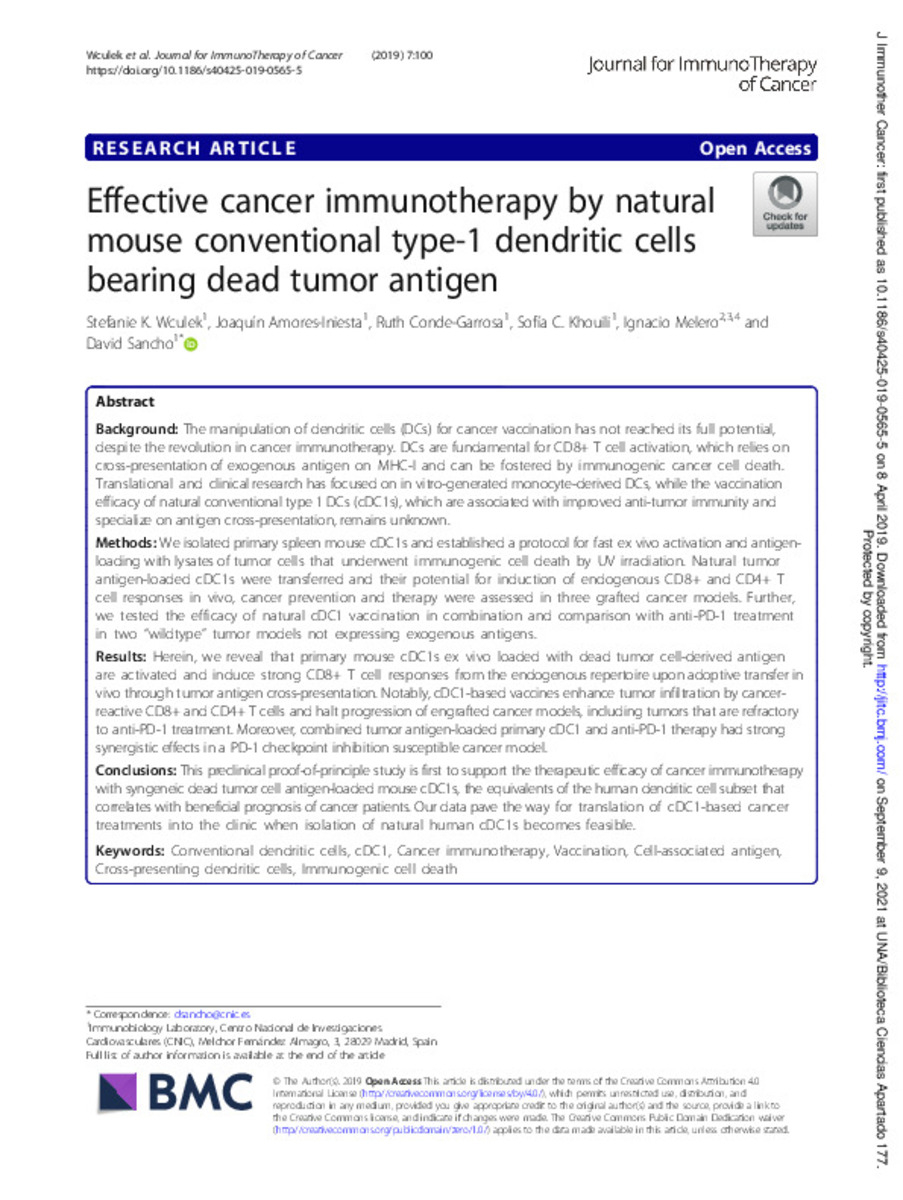Full metadata record
| DC Field | Value | Language |
|---|---|---|
| dc.creator | Wculek, S.K. (Stefanie K.) | - |
| dc.creator | Amores-Iniesta, J. (Joaquín) | - |
| dc.creator | Conde-Garrosa, R. (Ruth) | - |
| dc.creator | Khouili, S.C. (Sofía C.) | - |
| dc.creator | Melero, I. (Ignacio) | - |
| dc.creator | Sancho, D. (David) | - |
| dc.date.accessioned | 2021-09-20T07:58:39Z | - |
| dc.date.available | 2021-09-20T07:58:39Z | - |
| dc.date.issued | 2019 | - |
| dc.identifier.citation | Wculek, S.K. (Stefanie K.); Amores-Iniesta, J. (Joaquín); Conde-Garrosa, R. (Ruth); et al. "Effective cancer immunotherapy by natural mouse conventional type-1 dendritic cells bearing dead tumor antigen". Journal for ImmunoTherapy of Cancer. 7 (1), 2019, 1 - 16 | es_ES |
| dc.identifier.issn | 2051-1426 | - |
| dc.identifier.other | PMID: 30961656 | - |
| dc.identifier.uri | https://hdl.handle.net/10171/62013 | - |
| dc.description.abstract | Background: The manipulation of dendritic cells (DCs) for cancer vaccination has not reached its full potential, despite the revolution in cancer immunotherapy. DCs are fundamental for CD8+ T cell activation, which relies on cross-presentation of exogenous antigen on MHC-I and can be fostered by immunogenic cancer cell death. Translational and clinical research has focused on in vitro-generated monocyte-derived DCs, while the vaccination efficacy of natural conventional type 1 DCs (cDC1s), which are associated with improved anti-tumor immunity and specialize on antigen cross-presentation, remains unknown. Methods: We isolated primary spleen mouse cDC1s and established a protocol for fast ex vivo activation and antigen-loading with lysates of tumor cells that underwent immunogenic cell death by UV irradiation. Natural tumor antigen-loaded cDC1s were transferred and their potential for induction of endogenous CD8+ and CD4+ T cell responses in vivo, cancer prevention and therapy were assessed in three grafted cancer models. Further, we tested the efficacy of natural cDC1 vaccination in combination and comparison with anti-PD-1 treatment in two "wildtype" tumor models not expressing exogenous antigens. Results: Herein, we reveal that primary mouse cDC1s ex vivo loaded with dead tumor cell-derived antigen are activated and induce strong CD8+ T cell responses from the endogenous repertoire upon adoptive transfer in vivo through tumor antigen cross-presentation. Notably, cDC1-based vaccines enhance tumor infiltration by cancer-reactive CD8+ and CD4+ T cells and halt progression of engrafted cancer models, including tumors that are refractory to anti-PD-1 treatment. Moreover, combined tumor antigen-loaded primary cDC1 and anti-PD-1 therapy had strong synergistic effects in a PD-1 checkpoint inhibition susceptible cancer model. Conclusions: This preclinical proof-of-principle study is first to support the therapeutic efficacy of cancer immunotherapy with syngeneic dead tumor cell antigen-loaded mouse cDC1s, the equivalents of the human dendritic cell subset that correlates with beneficial prognosis of cancer patients. Our data pave the way for translation of cDC1-based cancer treatments into the clinic when isolation of natural human cDC1s becomes feasible. | es_ES |
| dc.description.sponsorship | Work in the DS laboratory is funded by the CNIC and grant SAF2016–79040-R from Ministerio de Ciencia, Innovación e Universidades (MCIU), Agencia Estatal de Investigación and Fondo Europeo de Desarrollo Regional (FEDER); B2017/ BMD-3733 Immunothercan-CM from Comunidad de Madrid; RD16/0015/0018- REEM from FIS-Instituto de Salud Carlos III, MICINN and FEDER; Acteria Foundation; Constantes y Vitales prize (Atresmedia); La Marató de TV3 Foundation (201723); and the European Research Council (ERC-2016-Consolidator Grant 725091). Work at the IM laboratory is funded by grants from MCIU (SAF2014–52361-R and SAF2017–83267-C2–1-R) and by European Commission VII Framework and Horizon 2020 programs (AICR), Fundación de la Asociación Española Contra el Cáncer (AECC), and Fundación BBVA. SKW is supported by a European Molecular Biology Organization Long-term Fellowship (grant ALTF 438– 2016) and a CNIC-International Postdoctoral Program Fellowship (grant 17230– 2016). SCK is a recipient of a FPU fellowship (FPU16/03142) from the Spanish Ministry of Education, Culture and Sports. IM and DS labs are funded by the European Commission (635122-PROCROP H2020). The CNIC is supported by the MCIU and the Pro-CNIC Foundation, and is a Severo Ochoa Center of Excellence (SEV-2015-0505). | es_ES |
| dc.language.iso | eng | es_ES |
| dc.publisher | BMJ | es_ES |
| dc.relation | info:eu-repo/grantAgreement/EC/H2020/725091/EU | es_ES |
| dc.relation | info:eu-repo/grantAgreement/EC/H2020/635122/EU | - |
| dc.rights | info:eu-repo/semantics/openAccess | es_ES |
| dc.subject | Materias Investigacion::Ciencias de la Salud::Inmunología | es_ES |
| dc.subject | Conventional dendritic cells | es_ES |
| dc.subject | cDC1 | es_ES |
| dc.subject | Cancer immunotherapy | es_ES |
| dc.subject | Vaccination | es_ES |
| dc.subject | Cell-associated antigen | es_ES |
| dc.subject | Cross-presenting dendritic cells | es_ES |
| dc.subject | Immunogenic cell death | es_ES |
| dc.title | Effective cancer immunotherapy by natural mouse conventional type-1 dendritic cells bearing dead tumor antigen | es_ES |
| dc.type | info:eu-repo/semantics/article | es_ES |
| dc.description.note | This article is distributed under the terms of the Creative Commons Attribution 4.0 International License (http://creativecommons.org/licenses/by/4.0/), which permits unrestricted use, distribution, and reproduction in any medium, provided you give appropriate credit to the original author(s) and the source, provide a link to the Creative Commons license, and indicate if changes were made. The Creative Commons Public Domain Dedication waiver (http://creativecommons.org/publicdomain/zero/1.0/) applies to the data made available in this article, unless otherwise stated. | es_ES |
| dc.identifier.doi | 10.1186/s40425-019-0565-5 | - |
| dadun.citation.endingPage | 16 | es_ES |
| dadun.citation.number | 1 | es_ES |
| dadun.citation.publicationName | Journal for ImmunoTherapy of Cancer | es_ES |
| dadun.citation.startingPage | 1 | es_ES |
| dadun.citation.volume | 7 | es_ES |
Files in This Item:
Statistics and impact
Items in Dadun are protected by copyright, with all rights reserved, unless otherwise indicated.






